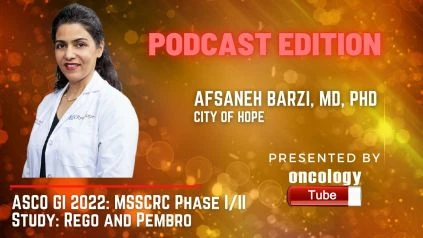Afsaneh Barzi, MD, Ph.D., Director, Employer Strategy (AccessHope); Associate Professor, Department of Medical Oncology & Therapeutics Research at the City of Hope. In this video, she speaks about the ASCO GI 2022 Abstract – Phase I/II study of regorafenib (rego) and pembrolizumab (pembro) in refractory microsatellite stable colorectal cancer (MSSCRC).
History:
In MSSCRC, immune checkpoint inhibitors (ICI) are ineffective. The use of ICI in combination with targeted therapies has the potential to change the tumor microenvironment and make these malignancies more sensitive to ICI. The results of a multicenter rego and pembro study in a varied patient population with advanced MSSCRC are presented.
Methodologies:
At three sites, patients (pts) who had failed or were intolerant of chemotherapy were included in this investigator-initiated trial. For phase I, a 3+3 design was employed to assess escalating dosages of rego (80,120,160, days 1-14/21) in combination with pembro (200m/q3weeks) in a 3+3 design. During the first cycle, the primary outcome was dose-limiting toxicities. In phase II, patients were given rego with pembro at the recommended phase II dose (RP2D). The main outcome measure was progression-free survival (PFS). Overall survival (OS) and objective response rate (ORR) were secondary goals (ORR). The trial was designed to show a 2.85-month increase in PFS from 1.9 months (CORRECT data). The sample size for phase II was estimated to be 63 points.
Findings:
The study began in July 2019 and will end in July 2021. Ten people were enrolled in phase I and 63 in phase II out of a total of 73. Rego RP2D was 80 mg, days 1-14/21, and 70 patients were treated with it. As of September 14, 11 patients were still receiving treatment. At baseline, the median age was 54 years (23-81), with 51 percent of the patients being female, 53 percent white, 19 percent Asian, 12 percent black, and 11 percent Hispanic, median prior lines of therapy being 2 (1-5), primary tumor location rectosigmoid/rectal 13 percent, KRAS mutation 68 percent, and BRAF mutation 5%. In 78 percent of the patients, liver metastases were found. There was no toxicity of grade 4. Rashes were the most common grade 3 toxicity (20%), followed by hand-foot syndrome and HTN (7 percent ). In 14% of the cases, a dose adjustment was required. Disease progression was the most common reason for cessation (85 percent), followed by loss of permission (12 percent ). The median PFS was 2.0 (1.8-3.5) months, and the median OS was 10.9 (5.3-NR) months, with a median follow-up of 5.3 (range:0.6-24.4) months. PFS was 4.3 (1.9-8.4) months in 16 patients (23%) with non-liver metastatic disease. There was no objective response. Stable illness was seen in 49 percent of patients, with a median duration of 2 (0.2-18.8) months.
Outcomes:
This is the largest trial of ICI + rego in MSSCRC that has been reported to date. The trial’s primary goal was not met, although the median OS is intriguing. Biomarkers are being studied to identify patients who will benefit for a longer period of time. NCT03657641 is the number for the clinical trial.

